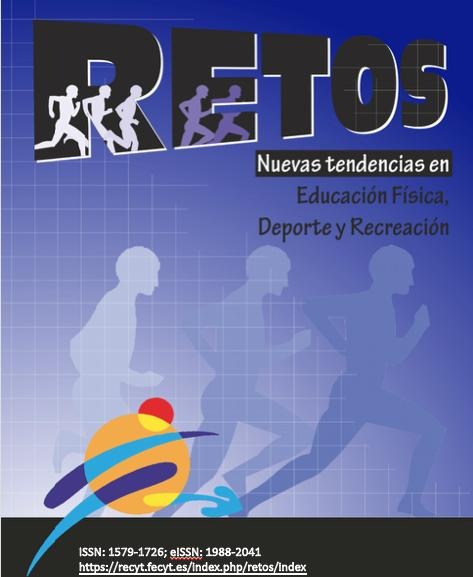Right to equality and non-discrimination in sport
DOI:
https://doi.org/10.47197/retos.v71.117310Keywords:
Discrimination , equality, gender equity, public policies, sportAbstract
Introduction: Gender equality in sports remains a structural challenge across institutional, social, and cultural dimensions. In Ecuador, women athletes continue to face barriers related to access, visibility, and recognition.
Objective: This study aimed to analyze the dynamics of inequality and discrimination in Ecuadorian sports from a gender equality rights perspective, in order to identify structural barriers, evaluate institutional policies, and propose inclusive strategies.
Methodology: A quantitative, descriptive-correlational design was used. The population consisted of 348 participants (athletes, coaches, and sports officials). A validated questionnaire was applied, and descriptive statistics, Spearman’s correlation, and Mann-Whitney and Kruskal-Wallis tests were conducted.
Results: Findings showed that women reported higher perceptions of inequality in access to resources, leadership roles, and media coverage. 58% of female respondents experienced discriminatory situations. Most participants were unaware of institutional protocols against gender-based violence. Significant differences were found by gender and professional role.
Discussion: The results aligned with previous studies indicating the persistence of patriarchal structures in sports. The study highlighted the need for effective implementation of existing policies and gender-focused training programs.
Conclusions: Although legal progress has been made, achieving real gender equality in Ecuadorian sports requires structural transformation. This study offers empirical insights for the design of sports policies grounded in human rights and gender equity.
References
Arguello, E. (2018). Violencia de género en el deporte: un análisis desde el ordenamiento jurídico ecuatoriano. Revista de la Facultad de Derecho de México, 68(272), 83-107. https://dx.doi.org/10.22201/fder.24488933e.2018.272-1.67592
Barcia, A., Mayanza, O., Vásquez o, E. y Morejón, S. (2024). La equidad de género en las organizaciones deportivas ecuatorianas (Gender equality in Ecuadorian sports organizations). Retos, 55, 915–921. https://doi.org/10.47197/retos.v55.106038
Bisquerra, R. (2009). Metodología de la investigación educativa. Madrid: La Muralla.
Caicedo, M., Santander, M., Pineda, G. y Potosí, E. (2024). Liderazgo afroecuatoriano: Mujeres que abren camino en la cultura, el deporte y la sociedad. Revista Social Fronteriza, 4(2), 1 – 24. https://doi.org/10.59814/resofro.2024.4(2)224
Donoso, B., Reina, A. y Álvarez, A. (2023). Desigualdad de género en el deporte de competición: voces y reflexiones. Retos, 47, 557–564. https://doi.org/10.47197/retos.v47.93006
Galarza, A., Fierro, J., Nicola Freire, M. y Clavijo, Y. (2025). Brechas de género en el deporte en Guayas: Realidades, desafíos y equidad en la representación femenina en las organizaciones deportivas. Retos, 68, 346–358. https://doi.org/10.47197/retos.v68.114221
García, M. (2022). Profesionalización del fútbol femenino en Argentina. Una conquista de derechos e igualdad aparente. Revista Electrónica del Instituto de Investigaciones Jurídicas y Sociales Am-brosio Lucas Gioja, (28), 183 – 209. http://revistas.derecho.uba.ar/index.php/revista-gioja/article/view/49/32
Hernández, R., Fernández, C. y Baptista, P. (2014). Metodología de la investigación (6.ª ed.). México: McGraw-Hill Education.
León, J. (2025). El contrato de trabajo en las federaciones deportivas provinciales del Ecuador. Revista Jurídica Crítica Y Derecho, 6(10), 55–63. https://doi.org/10.29166/cyd.v6i10.6966
Moscoso, D. y Martín, M. (2024). Desigualdades de las deportistas de alta competición en España y medidas para la igualdad efectiva. Sociología del deporte, 5(2), 1 - 3. https://doi.org/10.46661/socioldeporte.11390
Muñoz, E. (2023). Hacia una perspectiva inclusiva en la reciente Ley del Deporte: La igualdad como motor de la práctica deportiva. Revista Aranzadi de derecho de deporte y entretenimiento, (80), 4. https://reunir.unir.net/handle/123456789/16027
ONU Mujeres Ecuador. (2024). Acuerdo conjunto entre el Ministerio del Deporte y ONU Mujeres impulsa la igualdad de género en el deporte ecuatoriano. ONU Mujeres. [Fecha de consulta: 30 de Mar-zo de 2025] https://ecuador.unwomen.org/es/stories/noticia/2024/12/acuerdo-conjunto-entre-el-ministerio-del-deporte-y-onu-mujeres-impulsa-la-igualdad-de-genero-en-el-deporte-ecuatoriano
ONU Mujeres Ecuador. (2024). MUJERES Y DEPORTE 2: Una aproximación a la participación y presen-cia de las mujeres en el ámbito del deporte en Ecuador. ONU Mujeres. [Fecha de consulta: 30 de Marzo de 2025] https://ecuador.unwomen.org/es/digital-library/publications/2024/12/mujeres-y-deporte-2-una-aproximacion-a-la-participacion-y-presencia-de-las-mujeres-en-el-ambito-del-deporte-en-ecuador
ONU Mujeres Ecuador. (2024). Mindeporte y ONU Mujeres unen esfuerzos para generar espacios libres de violencia en el deporte ecuatoriano. ONU Mujeres. [Fecha de consulta: 30 de Marzo de 2025] https://ecuador.unwomen.org/es/stories/noticia/2024/05/mindeporte-y-onu-mujeres-unen-esfuerzos-para-generar-espacios-libres-de-violencia-en-el-deporte-ecuatoriano
Pérez, J. (2021). La protección y garantía constitucional para el deporte ecuatoriano. Revista Jurídica Crítica Y Derecho, 2(2), 30–42. https://doi.org/10.29166/cyd.v1i2.2788
Rodríguez, Á., Sabando, Y. y Soasti Mejía, A. (2022). Desigualdad de género en la actividad física y de-porte: Revisión sistemática. MENTOR Revista De investigación Educativa Y Deportiva, 1(3), 346–369. https://doi.org/10.56200/mried.v1i3.4762
UNESCO (2015). Carta Internacional de la Educación física, la actividad física y el deporte. [Fecha de consulta: 28 de Marzo de 2025] https://unesdoc.unesco.org/ark:/48223/pf0000235409_spa
Yépez, D. (2021). Ser mujer y negra en Ecuador: un oso panda sobre los hombros. [Fecha de consulta: 25 de Mayo de 2025] https://elpais.com/opinion/2021-08-09/ser-mujer-y-negra-en-ecuador-un-oso-panda-sobre-los-hombros.html
Downloads
Published
Issue
Section
License
Copyright (c) 2025 Andrea Stefania Izquierdo Noboa

This work is licensed under a Creative Commons Attribution-NonCommercial-NoDerivatives 4.0 International License.
Authors who publish with this journal agree to the following terms:
- Authors retain copyright and ensure the magazine the right to be the first publication of the work as licensed under a Creative Commons Attribution License that allows others to share the work with an acknowledgment of authorship of the work and the initial publication in this magazine.
- Authors can establish separate additional agreements for non-exclusive distribution of the version of the work published in the journal (eg, to an institutional repository or publish it in a book), with an acknowledgment of its initial publication in this journal.
- Is allowed and authors are encouraged to disseminate their work electronically (eg, in institutional repositories or on their own website) prior to and during the submission process, as it can lead to productive exchanges, as well as to a subpoena more Early and more of published work (See The Effect of Open Access) (in English).
This journal provides immediate open access to its content (BOAI, http://legacy.earlham.edu/~peters/fos/boaifaq.htm#openaccess) on the principle that making research freely available to the public supports a greater global exchange of knowledge. The authors may download the papers from the journal website, or will be provided with the PDF version of the article via e-mail.


